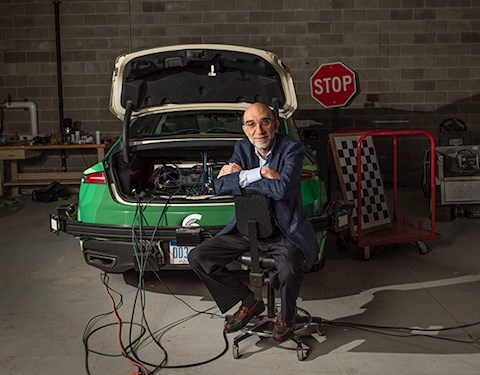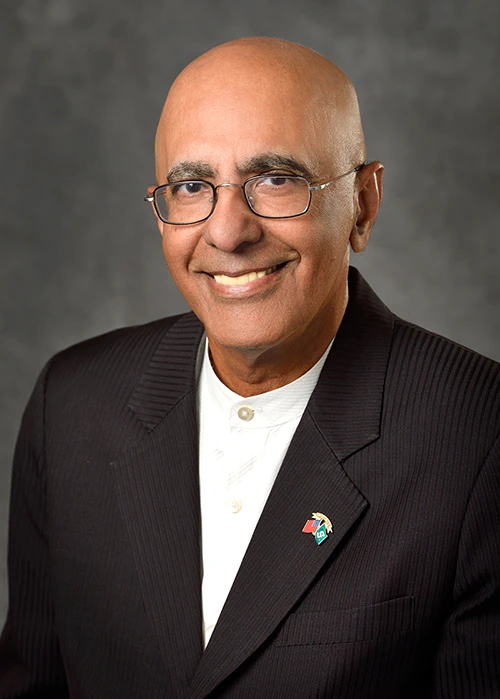-

Even low-intensity rain can really create some serious problems in detection, said CANVAS Director Hayder Radha.
#MSUMobility continues to draw media attention:
• The future of self-driving vehicles may be drizzling out - at least in Michigan, CANVAS Director and ECE professor Hayder Radha tells the industry-leading publication, Automotive News. "When we run these algorithms, we see very noticeable, tangible degradation in detection," Radha said. "Even low-intensity rain can really create some serious problems, and as you increase the intensity, the performance of what we consider state-of-the-art mechanisms can almost become paralyzed."
• MSU is making driverless cars more human. ECE Professor Hayder Radha of the MSU College of Engineering said an important part of the research is understanding how a human driver reacts to various objects on or near a roadway, such as an animal, a bicyclist, an adult pedestrian or an unaccompanied child at play.
• MSU is transforming its 5,200-acre campus into a live, connected ecosystem to drive mobility research and development to advance smart-vehicle technology and better understand the human element. "MSU's campus is unrivaled in scope, size and diverse mobility environments, providing an ideal testing ground and validation site," said Leo Kempel, dean of MSU's College of Engineering.
• MSU Foundation Professor Peter Savolainen, of civil and environmental engineering, came to MSU to study road user behaviors, and asks, "Are you an excellent driver?" in this faculty column for MSU.
Other media in November:
National media is featuring collaborative research by NYU scientists and Arun Ross, professor of computer science and engineering, "Artificial Intelligence Is Giving Rise to Fake Fingerprints. Here's Why You Should be Worried." (There are pending interviews with The Wall Street Journal and New York Times.)

University Distinguished Professor of Computer Science & Engineering Anil Jain:
Machine learning can create fake "master key" fingerprints - MSU Biometrics researcher Anil Jain said it's hard to extrapolate the research out to an actual use case, but the strength of the work is in the machine learning techniques it developed.
"The argument [for bio-based plastics] is the inherent value of reducing the carbon footprint," University Distinguished Professor of Chemical Engineering and Materials Science Ramani Narayan told National Geographic. He's among the experts who weigh in on "What you need to know about plant-based plastics."
Norbert Miller, associate professor of mechanical engineering with a specialty in turbomachines, joined with four MSU researchers for a study for the National Academy of Sciences that suggests large hydropower dams may not be sustainable in the developing world.
MSU's Fraunhofer USA is celebrating 25 years of innovation and collaboration.
Assaf Gillad, chief of the Division of Synthetic Biology and Regenerative Medicine in the Institute for Quantitative Health Science & Engineering, is using synthetic biology and regenerative medicine to tackle fundamental research questions.
MSU scientists are using electricity and man-made diamonds to pulverize PFAS from water, saying the process could eventually be used to clean the likely carcinogen from landfills and wastewater treatment plants. MSU-Fraunhofer USA scientist Cory Rusinek lectured on the topic at the MSU Bioeconomy Institute in Holland Nov. 28.
Bryan Smith, associate professor of biomedical engineering, and a former colleague at Stanford University have created a computer simulation, validated by experimental results, to help design drug-delivery nanoparticles that carry cancer-fighting medicines directly to tumors. Their research was published in Biophysical Journal.
Alumni
Penny Wirsing (BS CIV EGR "83) environmental manager at Torrance Refining Company LLC was inaugurated as president of the largest nonprofit professional association for women in engineering, the Society of Women Engineers at a reception in Redondo Beach, Calif., in late summer.
Marc Smeyers (BS ELEC EGR '00) has been promoted to chief technology officer at the Grand Haven-based GHSP, a subsidiary of Grand Haven-based JSJ Corporation. He joined GHSP in 2016 and most recently served as vice president of engineering.
MSU College of Engineering Media and Public Relations page

